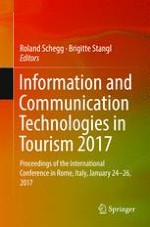2017 | OriginalPaper | Chapter
(Dis)Connectivity in the Travel Context: Setting an Agenda for Research
Authors : Barbara Neuhofer, Adele Ladkin
Published in: Information and Communication Technologies in Tourism 2017
Publisher: Springer International Publishing
Activate our intelligent search to find suitable subject content or patents.
Select sections of text to find matching patents with Artificial Intelligence. powered by
Select sections of text to find additional relevant content using AI-assisted search. powered by
